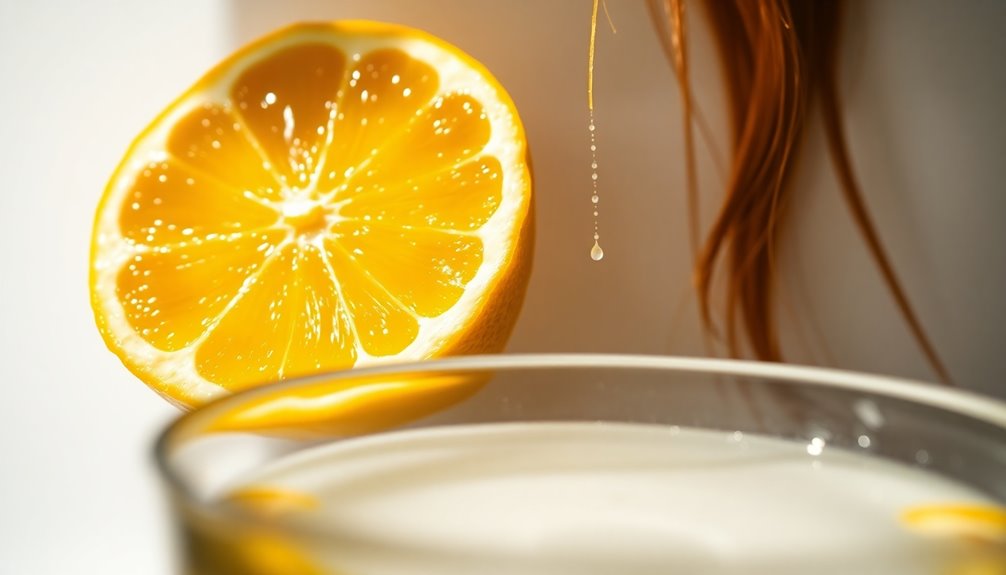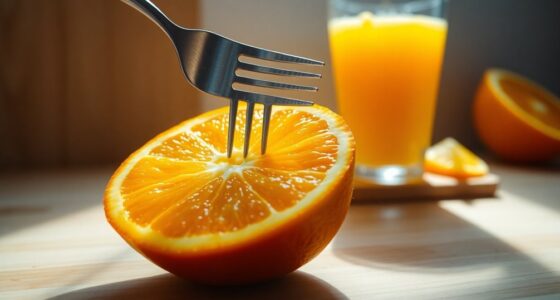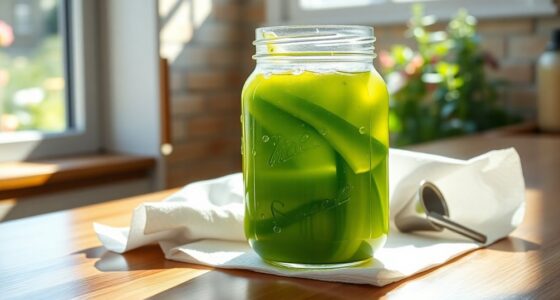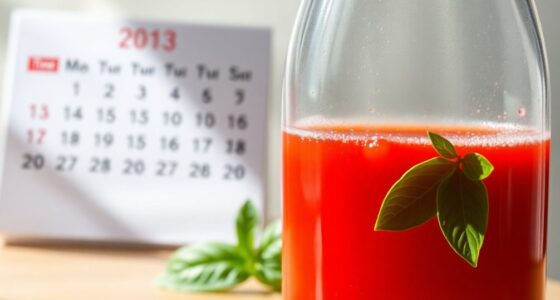To get rust out of your hair using lemon juice, mix half a cup of organic lemon juice in a spray bottle. Dampen your hair, then spray the lemon juice directly onto the rusty areas. Let it sit for 30 seconds to a minute, and you might feel a mild tingle. Rinse your hair thoroughly with cold water afterward to seal the cuticles, enhancing shine. There are more tips and remedies that can help you maintain your hair's health and color.
Key Takeaways
- Prepare a spray bottle with half a cup of fresh organic lemon juice to effectively remove rust from hair.
- Dampen your hair before spraying the lemon juice directly onto the rusted areas for optimal results.
- Allow the lemon juice to sit for 30 seconds to one minute, experiencing a mild tingle during the treatment.
- Rinse your hair thoroughly with cold water afterward to seal hair cuticles and maintain shine.
- Consider mixing lemon juice with baking soda for enhanced cleaning power and explore additional natural remedies for rust removal.
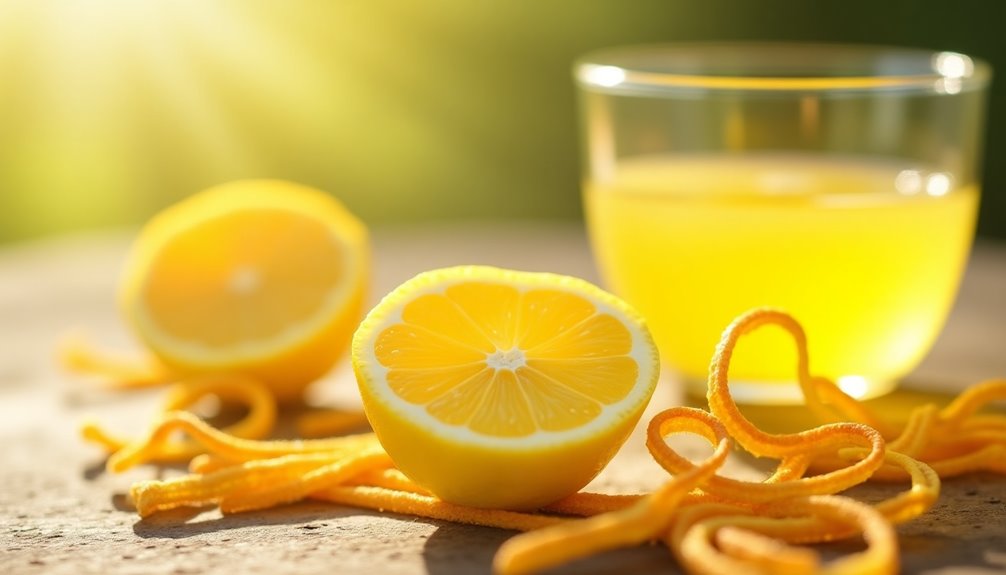
If you've ever found rust in your hair, don't panic—getting it out is easier than you might think. Rust can result from exposure to metal, especially if you've been using certain tools or swimming in water with high iron content.
Fortunately, lemon juice is a natural remedy that can help you remove rust effectively. The acidity in lemon juice works wonders in breaking down iron particles, making your hair look and feel cleaner.
To start, grab a spray bottle and fill it with about half a cup of organic lemon juice. It's best to use fresh lemon juice for optimal results. If you want to boost the cleaning power, you can add a tablespoon of baking soda to the lemon juice. This combination not only enhances the rust removal process but also helps restore your hair's natural hue. The fizz from the baking soda reacting with the lemon juice is a good sign that it's working.
Now, dampen your hair before applying the mixture. Spray the lemon juice directly onto your hair, ensuring you cover all the rusty areas. It's crucial to let the lemon juice sit in your hair for about 30 seconds to one minute. This short wait allows the mild acidity to neutralize and dissolve the iron buildup effectively. During this time, you might feel a little tingle, but that's just the lemon juice doing its job.
After the treatment, rinse your hair thoroughly with cold water. This step is essential to remove any residue and prevent your hair from drying out. Cold water helps seal the hair cuticles, keeping your locks smooth and shiny. You might find that your hair looks brighter and feels lighter after this process.
For best results, consider making lemon juice a part of your hair care routine. Using it as a weekly treatment can help maintain your hair color and prevent rust buildup in the long run. If you notice that rust tends to accumulate, don't hesitate to try using lemon juice more frequently. It's a simple, cost-effective solution that can keep your hair looking vibrant.
In addition to lemon juice, you can also explore other natural methods for removing rust from your hair. For instance, mixing a cup of water with a tablespoon of baking soda can create a paste that you can apply to your hair. This method can also be effective in removing rust, as baking soda is a gentle abrasive that helps lift stains and buildup.
Frequently Asked Questions
Can Lemon Juice Remove Rust?
Yes, lemon juice can remove rust due to its natural acidity.
When you apply it directly to rust stains, the citric acid helps break down the iron particles. Just saturate the affected area with lemon juice and let it sit for about 10 minutes before rinsing thoroughly.
For tougher rust, you might want to combine it with other treatments like baking soda or clarifying shampoos to enhance its effectiveness.
Does Lemon Juice Remove Iron From Hair?
Yes, lemon juice can effectively remove iron from your hair. Its natural acidity helps to bind with iron particles, making it easier for you to wash them away.
To use it, just spray some lemon juice onto your damp hair, let it sit for about 30 seconds, and then rinse.
Regularly incorporating this treatment into your hair care routine can help maintain your hair's natural appearance and prevent iron buildup.
What Happens if You Put Lemon Juice in Your Hair?
When you put lemon juice in your hair, you'll notice the acidity works to neutralize unwanted iron particles and can lighten your hair naturally.
It binds to rust and helps in the removal process during rinsing. You might find that your hair's natural color is restored after a treatment.
Just remember, while it's effective, too much lemon juice can dry out your hair, so always follow up with a good conditioner.
Can Lemon Juice Take Color Out of Hair?
You mightn't realize it, but lemon juice does have a knack for lightening hair color over time.
If you're considering using it, keep in mind that while it can brighten your strands, it might strip some of your hair's color, especially if it's chemically treated.
You'll want to use it sparingly and follow up with a deep conditioner to keep your hair healthy and minimize any unwanted fading.
Conclusion
In the dance between hair and rust, lemon juice emerges as the graceful partner, effortlessly lifting the stubborn stains away. With its acidic embrace, it transforms a tangled situation into a fresh start, leaving your locks revitalized and vibrant. So, when life throws rust your way, remember this zesty remedy. Embrace the natural solution and watch as your strands reclaim their brilliance, shining like the sun breaking through the clouds after a storm.
Cindy thoroughly researches juicing trends, techniques, and recipes to provide readers with practical advice and inspiration. Her writing style is accessible, engaging, and designed to make complex concepts easy to understand. Cindy’s dedication to promoting the advantages of juicing shines through her work, empowering readers to make positive changes in their lives through the simple act of juicing.

